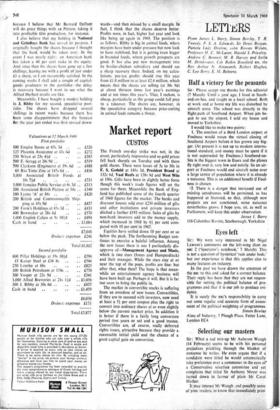Market report
CUSTOS
The French one-day strike was not, in the event, particularly impressive-and so gold prices fell back sharply on Tuesday and with them gold shares. There were losses of 5s to lOs in F. S. Geduld at 141s 3d, President Brand at 132s 6d, Vaal Reefs at 138s 9d and West Wits at 190s. Gilts have been in slightly better form though this week's trade figures will set the scene for them. Meanwhile the Bank of Eng- land has published some of the fourth quarter of 1968 figures for the market. The banks and discount houses sold over £230 million of gilts and other institutions and private investors ditched a further £193 million. Sales of gilts by non-bank investors add to the money supply, which increased in 1968 by 61 per cent com- pared with 10 per cent in 1967.
Equities have settled down 10 per cent or so below the peak. The forthcoming Budget con- , tinues to exercise a baleful influence. Among the new issues there is one I particularly dis- approve of—Management Agency and Music, which is two stars (Jones and Humperdinck) and their manager. While the stars stay at or near the top of the pops, profits are fine: but after that, what then? The hope is that mean- while an entertainment agency business will have been built up. Perhaps it will. But it is far too soon to bring the public in.
The market in convertible stocks is suffering from an overdose of new issues. Convertibles, if they are to succeed with investors, now need at least a 51 per cent coupon plus the right to convert into ordinary shares at or even slightly below the current market price. In addition it is better if there is a fairly long conversion period (ten years or so) and a good trustee. Convertibles are, of course, really deferred rights issues, attractive because they provide a reasonable initial yield and the chance of a good capital gain on conversion.


































 Previous page
Previous page